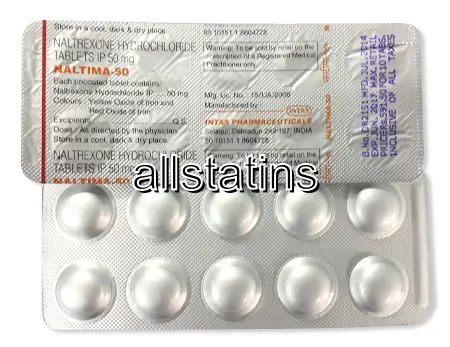Buy Naltrexone Online in New Zealand | All Statins New Zealand
| Package | Dosage | Price | Price per Dose | |
|---|---|---|---|---|
| Dosage: 50mg | ||||
| 90 pill | 50mg | NZD1,818.56 | NZD20.22 | |
| 60 pill | 50mg | NZD1,250.25 | NZD20.85 | |
| 30 pill | 50mg | NZD705.87 | NZD23.51 | |
| 20 pill | 50mg | NZD502.47 | NZD25.07 | |
| 10 pill | 50mg | NZD272.16 | NZD27.28 | |

Naltrexone Description
What Is Naltrexone?
Naltrexone is a medication primarily used to help individuals overcome alcohol dependence and opioid addiction. It works by blocking the effects of opioids on the brain, which can reduce cravings and prevent relapse. Naltrexone is available in oral tablet form and as an injectable, long-acting version. It is generally prescribed as part of a comprehensive treatment plan that includes counseling and support. Naltrexone's ability to diminish the pleasurable effects of alcohol and drugs makes it a valuable tool in addiction management.
How Does Naltrexone Work?
The medication acts as an opioid antagonist, meaning it binds to the opioid receptors in the brain but does not activate them. Instead, it prevents other opioids—such as heroin or prescription painkillers—from exerting their effects. For alcohol dependence, it influences the brain's reward system, making drinking less rewarding. This reduction in reward can help individuals resist the urge to drink or use opioids. Naltrexone's action helps restore a more balanced brain chemistry, supporting recovery efforts.
Uses and Benefits
Naltrexone is most commonly prescribed for alcohol dependence and opioid addiction. In alcohol-related cases, it can decrease the frequency and intensity of drinking episodes. For opioid dependence, it helps prevent relapse following detoxification. Patients often find that Naltrexone reduces cravings and the desire to use substances, which is a crucial support during the recovery process. Additionally, the injectable form offers a long-lasting option, typically administered once a month, increasing adherence to treatment plans.
Potential Side Effects
Like any medication, Naltrexone can cause side effects. Common ones include nausea, headache, dizziness, and fatigue. Some users may experience gastrointestinal issues or nervousness. Rarely, more serious effects such as liver toxicity can occur, especially if taken in high doses or if pre-existing liver conditions are present. It is essential for healthcare providers to monitor liver function during treatment. Patients should report any unusual symptoms promptly to ensure safety and proper management.
Precautions and Interactions
Naltrexone is not suitable for everyone. Individuals with acute hepatitis or liver failure should avoid it unless directed otherwise by a healthcare professional. It also interacts with opioid medications, so it is important to disclose any other drugs being taken. Patients should avoid using opioids while on Naltrexone to prevent precipitating withdrawal symptoms. Alcohol consumption should be discussed with the healthcare provider, as combining Naltrexone with alcohol is generally safe but may still produce side effects in some cases.
Conclusion
Overall, Naltrexone is an effective medication for managing alcohol dependence and opioid addiction. It supports recovery by reducing cravings and blocking the effects of opioids. When used responsibly and under medical supervision, Naltrexone can be a valuable part of a comprehensive treatment plan. Patients should adhere to prescribed dosages and attend regular follow-up appointments to maximize benefits and minimize risks. With proper use, Naltrexone can significantly improve the chances of long-term sobriety and a healthier life.
